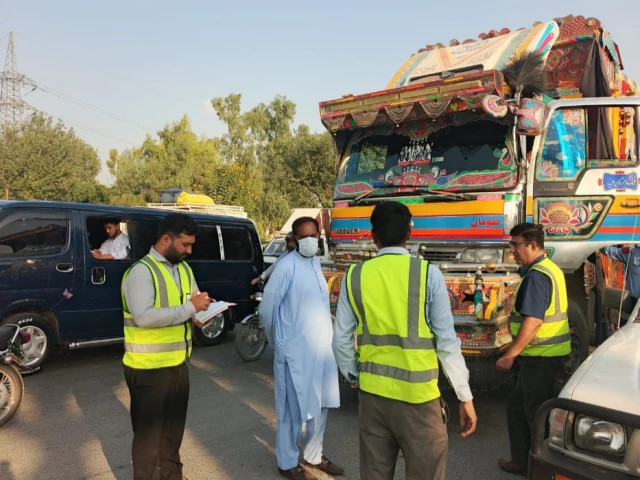Pak-EPA cracks down on polluting vehicles, is yours on the list?
50 vehicles inspected in Islamabad, fines and warnings issued

The Pakistan Environmental Protection Agency has started cracking down on vehicular emissions across Islamabad to combat worsening air quality as winter approaches. The initiative was announced in a press release Tuesday from the Ministry of Climate Change & Environmental Coordination.
“We are striving for an environmentally sustainable Pakistan where economic progress and public health go hand in hand,” said Muhammad Saleem Shaikh, spokesperson for the Ministry of Climate Change and Environmental Coordination. According to the press release, Pak-EPA’s Environmental Monitoring Team, in coordination with the Islamabad Capital Territory Police, carried out a detailed inspection at Jhangi Syedan, Stop No. 26. The inspection targeted emissions from heavy transport vehicles including trailers, trucks, mini-trucks, and loaders.
Out of 50 vehicles examined during the drive, 13 were fined for non-compliance, 17 were issued warning notices, while 20 met the required environmental standards. Smoke opacity and noise levels were among the key parameters assessed.
“This proactive monitoring reflects the government’s unwavering commitment to reducing air pollution and protecting public health,” said Shaikh. “Vehicular emissions remain one of the biggest contributors to urban smog, and Pak-EPA’s consistent enforcement is a cornerstone of our clean air strategy for the city and its suburbs.”
The campaign is part of the government’s broader push for environmental sustainability and public health protection. With smog season around the corner, drivers are encouraged to ensure vehicles comply with the National Environmental Quality Standards (NEQS).
Read: Diwali smog from India chokes Punjab
The NEQS guidelines outline the following criteria for vehicles. Vehicles must not emit black smoke thicker than 40% opacity or 2 on the Ringlemann Scale during acceleration. The vehicle's carbon monoxide level from the exhaust must be below 6%. Additionally, vehicles must not be louder than 85 decibels (dB) at 7.5 meters distance, while idling. They must also meet specific limits for pollutants (CO, HC+NOx, Particulate Matter), which vary for different vehicle types.
The ministry also highlighted that pollutants such as particulate matter (PM), carbon monoxide (CO), and nitrogen oxides (NOx), commonly released by unregulated vehicles significantly worsen air quality and contribute to respiratory diseases, especially during the winter smog season.
Shaikh further stressed that the initiative goes beyond enforcement. “Our goal is not only enforcement but also public engagement. Cleaner air is a shared responsibility. Every driver, transporter, and citizen must play their role by keeping their vehicles maintained and avoiding harmful practices like open burning,” he said.
The press release emphasized that the present government is prioritizing clean air initiatives as part of Pakistan’s broader Sustainable Environment and Climate Resilience Agenda. These include vehicle monitoring, promoting clean fuels, and advancing electric mobility.
Read More: Lahore ranks second among world’s most polluted cities
Speaking on behalf of Pak-EPA, Director Mohsina Tunio underscored the importance of public cooperation. “When citizens cooperate with authorities, enforcement becomes education and education leads to change,” she said. “We encourage everyone to be part of the solution and support Islamabad’s journey toward cleaner air and a healthier environment.”
The agency confirmed that joint monitoring operations with the ICT Administration and Islamabad Traffic Police will continue in the coming weeks with increased frequency. These will focus on high-emission zones and key entry points to the city.
Vehicles found violating NEQS will be subject to fines, impoundment, or cancellation of their fitness certificates under the Pakistan Environmental Protection Act.
“Our message is clear: cleaner transport means healthier lungs, safer streets, and a sustainable future for our children,” Shaikh concluded.




















COMMENTS
Comments are moderated and generally will be posted if they are on-topic and not abusive.
For more information, please see our Comments FAQ